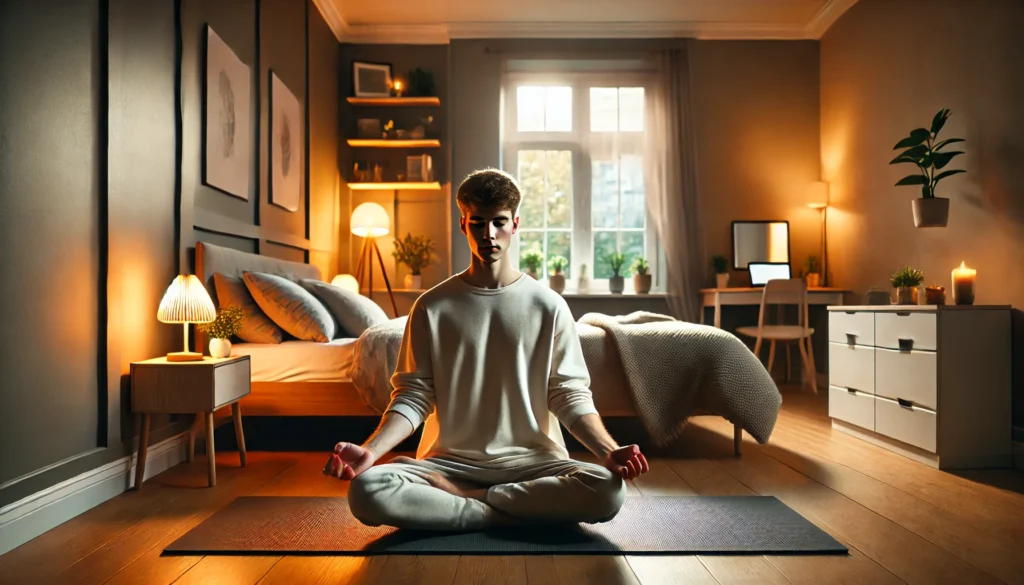Restorative sleep is a vital component of our overall health and well-being. It’s the deep, quality sleep our bodies need to repair and rejuvenate.
Yet, many of us struggle to achieve this type of sleep. We toss and turn, wake up feeling tired, and spend our days in a fog of fatigue.
This article aims to change that. It’s a comprehensive guide on how to get restorative sleep, filled with practical, evidence-based tips and strategies.
We’ll delve into the science of sleep, explaining what restorative sleep is and why it’s so important. We’ll also discuss the signs of non-restorative sleep and its potential health consequences.
Then, we’ll provide actionable advice on how to create a sleep-conducive environment and establish a sleep-enhancing routine. We’ll explore ways to manage stress and anxiety, which often interfere with sleep.
We’ll also discuss the role of technology and supplements in achieving restorative sleep. And, we’ll provide guidance on when it might be time to seek professional help.
Whether you’re a health and wellness coach, a science journalist, or a biohacker, this article is designed to provide you with the information you need to optimize sleep for better mental and physical health. Let’s dive in and start the journey towards achieving restorative sleep tonight.
You May Also Like: Sleep Hygiene: Key Practices for Health
Understanding Restorative Sleep
Restorative sleep is the cornerstone of a healthy life. It involves experiencing deep sleep stages critical for physical and mental repair. This type of sleep leaves us feeling refreshed and full of energy the next day.
The profound impact of restorative sleep extends beyond feeling rested. It is crucial for memory consolidation, learning, and emotional stability. Moreover, restorative sleep strengthens the immune system, aids muscle recovery, and balances hormones.
Identifying the key elements of restorative sleep can empower individuals to take control of their sleep quality. To achieve this, understanding the sleep cycle is essential. The cycle includes light sleep, deep sleep, and REM sleep.
Key elements of restorative sleep include:
- Adequate duration spent in deep sleep and REM cycles.
- Minimal sleep disturbances.
- Balanced circadian rhythm aligned with natural body clocks.
Restorative sleep not only enhances cognitive functions but also improves physical health. Lack of restorative sleep can lead to fatigue, impaired concentration, and mood swings. Recognizing its importance is the first step towards achieving better sleep.
Aiming for restorative sleep can dramatically enhance one’s quality of life. The pursuit involves making conscious lifestyle and environmental changes. In the following sections, we will explore ways to promote deep, restful sleep.
What Is Restorative Sleep?
Restorative sleep refers to the deep phase of sleep that crucially aids in physical and mental recovery. During this period, the body repairs tissues, builds bone and muscle, and strengthens the immune system.
REM sleep, a component of restorative sleep, is vital for cognitive functions such as memory and learning. Adequate REM sleep fosters creativity and problem-solving abilities. Conversely, insufficient REM sleep could hinder mental acuity.
It’s not just about sleeping more; it’s about quality. Ensuring restorative sleep requires managing factors that can disrupt these vital sleep stages. This often requires changes to both lifestyle and sleeping environment.
The Science of Sleep Cycles
Sleep cycles consist of stages, with each offering different benefits. A typical cycle includes light sleep, deep sleep, and REM sleep, occurring multiple times each night. Understanding these stages can help optimize for restorative sleep.
Deep sleep is crucial for physical restoration. During this phase, the body releases growth hormone, facilitating repair and growth. This stage is typically longer at the beginning of the night.
REM sleep, characterized by rapid eye movement, is key for cognitive and emotional health. This stage lengthens as the night progresses, usually occurring more frequently towards early morning. Without enough REM sleep, one might experience memory lapses.
Knowing the timing and functions of these stages can guide lifestyle changes for better sleep. Properly managed, each night can deliver the restorative benefits that the body and mind crave.

Identifying Non-Restorative Sleep
Identifying whether your sleep is restorative or not can be a game-changer for wellness. Non-restorative sleep often results in waking up feeling tired and groggy. Despite spending enough time in bed, the sleep quality is insufficient.
Several factors can disrupt sleep cycles, leading to non-restorative sleep. These include stress, poor sleep environments, and inconsistent sleep schedules. Additionally, certain medical conditions, such as sleep apnea, can prevent deep, restful sleep.
It’s important to recognize if non-restorative sleep is affecting daily life. Persistent fatigue, irritability, and difficulty concentrating are common indicators. Understanding these patterns is the first step toward addressing the underlying causes.
Moreover, identifying non-restorative sleep involves being aware of how you feel throughout the day. If you often require caffeine to stay alert or have a low mood, your sleep quality may need improvement. Addressing these signs early can help prevent long-term health issues.
Signs and Symptoms
One key sign of non-restorative sleep is feeling exhausted despite adequate sleep hours. This often manifests as grogginess immediately upon waking. Another common symptom is struggling to concentrate, resulting in decreased productivity.
Mood swings and irritability are also linked to non-restorative sleep. Individuals may find themselves easily frustrated or overwhelmed. These emotional fluctuations can lead to strained relationships and poor decision-making.
Health Consequences
The health consequences of non-restorative sleep are considerable and varied. Chronic fatigue can weaken the immune system, making one more susceptible to illnesses. Over time, this can lead to frequent colds or more serious health concerns.
Additionally, poor sleep quality can affect mental health. It can increase the risk of anxiety and depression. These conditions often have a cyclical relationship with sleep, exacerbating the problem if left unaddressed. Prioritizing restorative sleep can therefore significantly enhance both physical and mental well-being.
Creating a Sleep-Conducive Environment
A sleep-friendly environment can profoundly impact sleep quality. The right conditions help you achieve the deep sleep cycles necessary for restoration. Paying attention to your bedroom’s setting is a key step toward better rest.
Optimal Bedroom Conditions
Your bedroom should be a sanctuary designed for rest. Start by setting a comfortable temperature, ideally between 60 to 67 degrees Fahrenheit. A cool room helps the body lower its core temperature, signaling it’s time to sleep.
Consider the bedding and mattress, as they should provide adequate support and comfort. Soft, breathable fabrics can make a significant difference. This choice promotes relaxation and minimizes sleep disturbances caused by discomfort.
Clutter can also affect sleep, creating mental noise. Keep your bedroom tidy and organized. A clean, serene environment can help ease anxiety and foster a calm mindset, conducive to falling asleep and staying asleep.
The Role of Light and Noise
Light and noise play crucial roles in sleep quality. Exposure to bright artificial light in the evening can hinder melatonin production. This hormone is crucial for sleep, as it helps regulate the sleep-wake cycle.
To reduce light exposure, consider dimming lights an hour before bedtime. Blackout curtains or eye masks can also block any unwanted light. These adjustments help create a dark environment, which is ideal for sleep.
Noise control is another aspect that shouldn’t be overlooked. Unwanted sounds can disrupt sleep cycles and prevent deep sleep. Consider using white noise machines or earplugs to mask disruptive sounds. These tools can help create a more peaceful environment, allowing for uninterrupted rest.
Establishing a Sleep-Enhancing Routine
A routine tailored for better sleep can make a world of difference. Consistency is key when it comes to signaling your brain that it’s time to wind down. By integrating simple habits into your evening routine, you can substantially improve your sleep quality.
Pre-Sleep Activities to Calm the Mind
Engaging in calming activities before bed can set the stage for restful sleep. Avoiding screens and bright lights in the hour leading to bedtime is crucial. This reduction in light exposure helps melatonin production remain steady, facilitating sleep onset.
Consider adding relaxation techniques to your routine to ease mental tension. Meditation, deep breathing exercises, or gentle yoga can work wonders. These methods can soothe the mind, helping to dispel lingering worries from the day.
Journaling can also be beneficial, allowing you to process thoughts and clear your mind. By writing down what’s on your mind, you release those thoughts, making it easier to relax. Incorporating these activities can help transition from the day’s hustle to a peaceful night.
Diet and Exercise for Better Sleep
What you eat and when you eat can significantly influence sleep quality. Avoid consuming large meals or heavy snacks before bedtime, as digestion can keep you awake. Opt for a light snack if you’re hungry—something containing sleep-promoting nutrients like tryptophan can be helpful.
Be mindful of caffeine and alcohol intake, as both can disrupt your sleep. While caffeine can linger in your body for hours, alcohol might interfere with your sleep cycles. Aim to limit their consumption well before bedtime for optimal results.
Exercise is another vital factor. Regular physical activity can tire the body in a healthy way, promoting deeper sleep. However, try to schedule workouts earlier in the day, as exercising too close to bedtime may invigorate you, delaying sleep. By considering these dietary and exercise habits, you’ll create a foundation for achieving restorative sleep.

Managing Stress and Anxiety
Stress and anxiety can significantly hinder the ability to achieve restorative sleep. Tackling these issues requires a multifaceted approach. By adopting certain strategies, you can ease these mental burdens and improve your sleep.
Simple relaxation techniques can lower stress levels before bedtime. Consider incorporating a bedtime ritual focused on unwinding. Slow, deep breaths paired with calming imagery can ease a busy mind.
Mindfulness practices also offer effective stress relief. Techniques like mindfulness meditation center your thoughts and increase awareness, reducing anxiety. Regular practice can lead to longer-term reductions in stress.
Consistent relaxation rituals can create a peaceful transition to nighttime. Effective strategies may include:
- Guided imagery or visualization exercises.
- Gentle stretching or yoga to release tension.
- Listening to soothing music or nature sounds.
Relaxation Techniques That Work
Relaxation techniques are powerful tools in the quest for better sleep. One of the simplest yet highly effective methods involves deep breathing exercises. By focusing on slow, controlled breaths, you can activate the parasympathetic nervous system, promoting a sense of calm.
Progressive muscle relaxation is another technique worth exploring. This involves tensing and then slowly releasing each muscle group. It can help dissipate physical stress and guide the body toward relaxation.
Cognitive-Behavioral Strategies
Cognitive-behavioral strategies can also alleviate sleep-disrupting stress. Cognitive-Behavioral Therapy for Insomnia (CBT-I) is especially effective. This therapy targets negative thoughts and behaviors that contribute to sleep issues.
Identifying and challenging unhelpful thought patterns is a critical part of CBT-I. By reshaping these thoughts, you can reduce anxiety and foster healthier sleep habits. This process empowers you to break free from the cycle of stress and sleeplessness.
Leveraging Technology and Supplements
In today’s digital age, technology and supplements offer new methods to enhance sleep quality. They can provide insights into your sleep habits and support better rest. Though not a one-size-fits-all solution, they can complement traditional practices.
Sleep tracking devices and apps can reveal patterns in your sleep cycle. These insights help identify problems and foster improvements. Understanding your sleep stages allows for targeted changes to enhance restorative sleep.
Supplements are another tool in the sleep improvement arsenal. They should be used with caution and awareness. Some supplements, like melatonin, show promise in regulating sleep-wake cycles.
Consider these options to bolster your sleep efforts:
- Sleep Trackers: Devices like smartwatches that monitor sleep stages and cycles.
- Sleep Apps: Apps that analyze sleep data and provide feedback.
- Sleep Supplements: Natural supplements such as valerian root, magnesium, or melatonin.
Sleep Tracking and Apps
Sleep tracking devices and apps can be beneficial allies in improving sleep. These tools help monitor various sleep parameters, such as duration and efficiency. By understanding your sleep patterns, you can address specific concerns.
Many apps also offer guided sleep meditations and sounds. This not only promotes relaxation but integrates seamlessly into your nightly routine. Feedback from these tools helps fine-tune your habits for better results.
Safe Use of Sleep Aids
When considering sleep aids, safety and efficacy should remain priorities. Over-the-counter sleep aids and supplements may provide short-term relief. However, they are not a substitute for good sleep hygiene practices.
Consult a healthcare professional before starting any sleep aids. This ensures that the chosen supplement or medication is suitable for your needs. Using sleep aids responsibly can contribute to achieving restorative sleep without dependency.
Addressing Specific Sleep Disruptors
Common sleep disruptors can turn a peaceful night into a restless one. Identifying these issues is the first step toward achieving restorative sleep. Solutions can often involve simple lifestyle adjustments or specific interventions.
Key disruptors include nighttime awakenings, chronic pain, snoring, and restless leg syndrome. Each presents unique challenges that require tailored strategies. Addressing these factors can lead to substantial improvements in sleep quality.
Managing these disruptors often involves understanding their root causes. Each disruptor may need a unique approach based on individual circumstances. Consistent efforts can yield significant benefits over time.
Consider addressing these common disruptors:
- Nighttime Awakenings: Using relaxation techniques to quickly return to sleep.
- Chronic Pain: Utilizing supportive pillows or consulting a physiotherapist.
- Snoring: Evaluating weight, sleep position, or potential sleep apnea.
- Restless Leg Syndrome: Incorporating leg massages or lifestyle changes.
Handling Nighttime Awakenings
Waking up during the night is frustrating and disruptive. To quickly return to sleep, stay calm and relaxed. Avoid checking the time or stressing over lost hours.
Incorporate simple relaxation techniques like deep breathing or gentle stretching. These can ease tension and promote faster sleep onset. Consistency in practice enhances effectiveness over time.
Dealing with Chronic Pain and Discomfort
Chronic pain poses significant challenges to restful sleep. It can often be mitigated through ergonomic sleep setups. Proper mattresses and pillows provide necessary support and alleviate discomfort.
Consulting healthcare professionals, such as a physiotherapist, can provide tailored solutions. They may suggest exercises or adjustments to sleeping positions. Managing pain effectively lays the foundation for deep, restorative sleep.
Seeking Professional Help
Sometimes, despite best efforts, sleep issues persist. In such cases, seeking professional help is a wise decision. Persistent problems may signal an underlying sleep disorder needing specialized attention.
Professional evaluation can uncover issues like sleep apnea or severe insomnia. Addressing these conditions is crucial for health and well-being. Qualified specialists offer tailored treatment plans that lead to better sleep outcomes.
When to Consult a Sleep Specialist
Consult a sleep specialist if sleep disturbances continue for weeks. Untreated sleep disorders can severely impact life quality. Specialists use advanced assessments to identify specific problems.
Consider seeking help if you experience persistent fatigue or disrupted daily functioning. Early intervention can prevent complications and lead to more effective treatment. Engaging with professionals offers reassurance and targeted solutions for achieving restorative sleep.

Conclusion: Embracing a Holistic Approach to Restorative Sleep
Achieving restorative sleep requires more than isolated strategies. It involves a holistic approach to lifestyle and habits. By understanding and addressing various factors, you can significantly enhance your sleep quality.
Implementing consistent sleep routines, managing stress, and optimizing your environment are key steps. These efforts lead to better sleep and greater well-being. Remember, small changes can have a big impact, and patience is vital. Keep your focus on gradual improvements for lasting results.
Further Reading:
HSS: How to Improve Sleep Quality
Harvard Health Publishing: Insomnia: Restoring restful sleep
National Library of Medicine: Development and Evaluation of a Measure to Assess Restorative Sleep
Important Note: The information contained in this article is for general informational purposes only, and should not be construed as health or medical advice, nor is it intended to diagnose, prevent, treat, or cure any disease or health condition. Before embarking on any diet, fitness regimen, or program of nutritional supplementation, it is advisable to consult your healthcare professional in order to determine its safety and probable efficacy in terms of your individual state of health.
Regarding Nutritional Supplements Or Other Non-Prescription Health Products: If any nutritional supplements or other non-prescription health products are mentioned in the foregoing article, any claims or statements made about them have not been evaluated by the U.S. Food and Drug Administration, and such nutritional supplements or other health products are not intended to diagnose, treat, cure, or prevent any disease.


